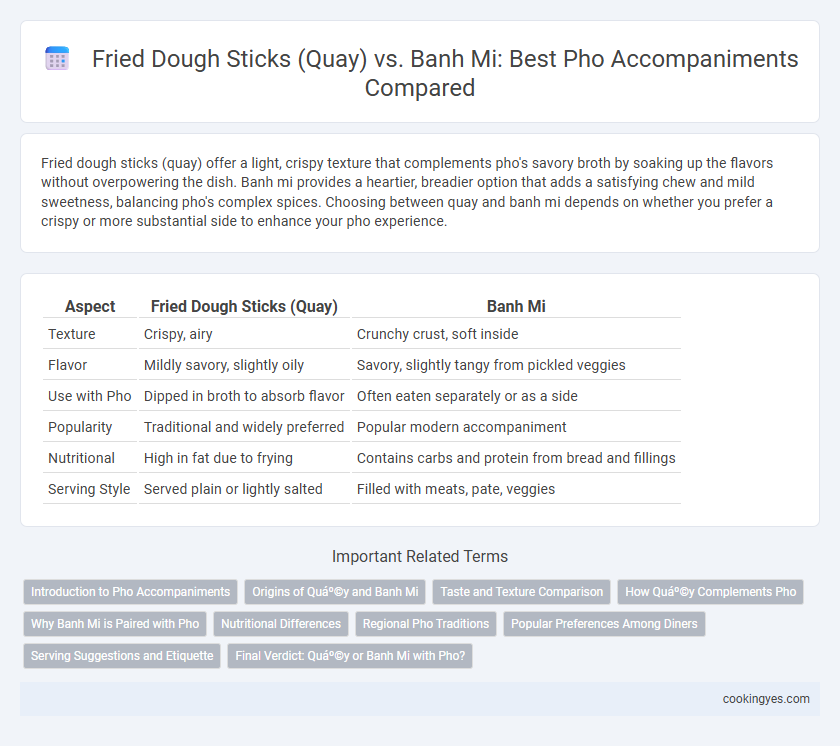Fried dough sticks (quay) offer a light, crispy texture that complements pho's savory broth by soaking up the flavors without overpowering the dish. Banh mi provides a heartier, breadier option that adds a satisfying chew and mild sweetness, balancing pho's complex spices. Choosing between quay and banh mi depends on whether you prefer a crispy or more substantial side to enhance your pho experience.
Table of Comparison
| Aspect | Fried Dough Sticks (Quay) | Banh Mi |
|---|---|---|
| Texture | Crispy, airy | Crunchy crust, soft inside |
| Flavor | Mildly savory, slightly oily | Savory, slightly tangy from pickled veggies |
| Use with Pho | Dipped in broth to absorb flavor | Often eaten separately or as a side |
| Popularity | Traditional and widely preferred | Popular modern accompaniment |
| Nutritional | High in fat due to frying | Contains carbs and protein from bread and fillings |
| Serving Style | Served plain or lightly salted | Filled with meats, pate, veggies |
Introduction to Pho Accompaniments
Fried dough sticks (quay) and banh mi are popular accompaniments that enhance the pho experience by adding distinct textures and flavors. Quay offers a crispy, airy contrast that complements the rich, savory broth, while banh mi provides a hearty, crusty element perfect for soaking up the soup. Choosing between quay and banh mi depends on personal preference and regional pho traditions.
Origins of Quẩy and Banh Mi
Fried dough sticks, known as quay, originated from Chinese youtiao and became a popular accompaniment to pho for their crispy texture and ability to absorb flavorful broth. Banh mi, a Vietnamese sandwich influenced by French baguettes, emerged during the colonial period and is less commonly paired with pho but remains a staple of Vietnamese street food culture. Both quay and banh mi reflect the diverse cultural influences that shape Vietnam's culinary heritage.
Taste and Texture Comparison
Fried dough sticks (quay) offer a crispy, airy texture that contrasts with pho's rich, savory broth, enhancing the overall eating experience with a light crunch. Banh mi provides a denser, chewy bite with a slightly tangy flavor from pickled vegetables and herbs, complementing pho by adding layers of complexity. The subtle saltiness of quay balances pho's umami, while banh mi introduces a robust, hearty element, making each suitable for different taste preferences.
How Quẩy Complements Pho
Fried dough sticks (quay) provide a crispy, airy texture that soaks up the rich, savory broth of pho, enhancing each spoonful with a satisfying crunch. Unlike banh mi, which offers a dense, chewy bite, quay's lightness balances pho's delicate flavors without overpowering the dish. This complementary texture and absorption capacity make quay a traditional and popular choice for enjoying pho authentically.
Why Banh Mi is Paired with Pho
Banh Mi is paired with pho because its crusty texture and savory fillings complement pho's rich, aromatic broth, adding a satisfying contrast in flavor and mouthfeel. Unlike fried dough sticks (quay), which provide a greasy, doughy taste, banh mi offers a balanced crunch and slight sweetness that enhances the dining experience. This combination highlights the harmony between pho's delicate noodles and the bold, flavorful bread, making banh mi an ideal accompaniment.
Nutritional Differences
Fried dough sticks (quay) contain higher calories and fat due to deep-frying, making them a richer, more indulgent accompaniment to pho. Banh mi, made from baguette bread, offers more complex carbohydrates and fiber while being lower in fat and calories. Choosing banh mi alongside pho supports a more balanced meal with sustained energy release and reduced fat intake.
Regional Pho Traditions
Fried dough sticks (quay) are a traditional accompaniment to pho in Northern Vietnam, enhancing the broth with their crispy texture and subtle oiliness. In contrast, banh mi is more commonly served alongside pho in Southern Vietnam, reflecting the region's preference for bolder, sweeter flavors that complement the pho's rich and aromatic broth. These regional differences highlight the diverse culinary customs that define the pho experience across Vietnam.
Popular Preferences Among Diners
Fried dough sticks (quay) are a popular accompaniment for pho due to their crispy texture and ability to soak up the rich broth, enhancing the overall dining experience. Banh mi, while a delicious Vietnamese sandwich, is less commonly paired directly with pho but is favored as a standalone meal or snack. Among diners, quay remains the preferred choice for complementing pho, especially in traditional settings where the combination highlights authentic flavors.
Serving Suggestions and Etiquette
Fried dough sticks (quay) provide a crunchy texture that complements the savory, aromatic broth of pho, typically dipped briefly before eating to maintain their crispiness and avoid sogginess. Banh mi, with its soft, airy bread and flavorful fillings, is usually enjoyed separately as a side, offering a balance of textures and tastes without directly mixing into the soup. Proper etiquette involves using quay sparingly within the pho to enhance the bite contrast, while banh mi is consumed alongside to cleanse the palate between spoonfuls.
Final Verdict: Quẩy or Banh Mi with Pho?
Fried dough sticks (quay) provide a crispy, airy texture that absorbs the rich pho broth, enhancing every spoonful with subtle savory notes. Banh mi offers a more robust, hearty companion with its crusty bread and diverse fillings, making pho a complete, satisfying meal. For a traditional, broth-centric experience, quay is ideal, while banh mi pairs best when you want a more filling, flavor-packed accompaniment to pho.
Fried dough sticks (quẩy) vs banh mi for pho accompaniments Infographic

 cookingyes.com
cookingyes.com